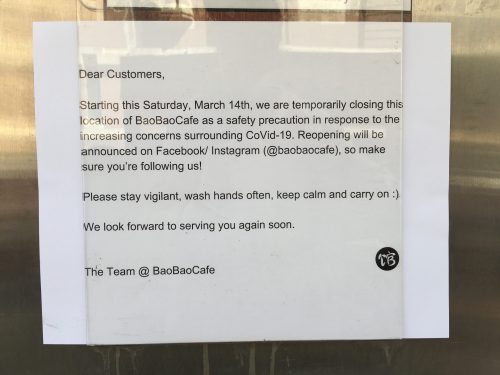Overview
New York City
The City will provide relief for small businesses across the City seeing a reduction in revenue because of COVID-19. Businesses with fewer than 100 employees who have seen sales decreases of 25% or more and that meet certain other criteria will be eligible for zero interest loans of up to $75,000 to help mitigate losses in profit.
The City is also offering similarly eligible small businesses in the five boroughs with fewer than 5 employees a grant to cover 40% of payroll costs for two months to help retain employees.
NYC small business relief: https://www1.nyc.gov/site/sbs/businesses/covid19-business-outreach.page
The City is providing information for parents on city schools, for businesses on restrictions on operations, and for residents on general tips on how to stay healthy and what to do if they get sick, as well as access to updated information on the current situation.
NYC guidance on responding to Covid-19: https://www1.nyc.gov/site/doh/health/health-topics/coronavirus.page
Mayor de Blasio finally responded to demands from parents and educators to close the city’s schools, announcing on March 15 they would close from March 16 to at least April 20. Distance learning began on March 23, and meals for students are available for pick-up at certain schools in each neighborhood around the city.
New York Times: https://www.nytimes.com/2020/03/15/nyregion/nyc-schools-closed.html
Mayor’s Office: https://www1.nyc.gov/office-of-the-mayor/news/151-20/new-york-city-close-all-school-buildings-transition-remote-learning
On the enforcement side, the City presented a plan to Governor Cuomo on March 24, as directed by him on March 22 after seeing crowds of people congregating around the city, especially in the parks, contrary to his orders for social distancing to combat the spread of the virus. Parks has cancelled or limited access to a number of its facilities and services and the NYPD began enforcing social distancing from the 23, according to various reports. Governor Cuomo noted in his March 25 media briefing that the plan also includes provisions for closing some streets in order to provide more room for people to walk at a safe distance from each other. The City announced the first street closures on March 26.
Media reports on March 26 say the Parks Department will remove the hoops from at least 80 basketball courts where young people have refused to stop playing pick-up games.
Parks update: https://www.nycgovparks.org/about/health-and-safety-guide/coronavirus
Wall Street Journal: https://www.wsj.com/articles/new-york-city-police-step-up-patrols-to-enforce-social-distancing-11584997999
Street closures: https://abc7ny.com/traffic/4-nyc-streets-closed-to-traffic-open-for-social-distancing-space/6052003/
New York Post: https://nypost.com/2020/03/25/de-blasio-removing-some-city-basketball-hoops-to-stop-games-during-coronavirus/

New York State
Executive Orders by Governor Cuomo
New York State has taken a number of actions in response to Covid-19, including measures to ameliorate the economic impact on businesses and individuals. Some of the major ones include:
Source: https://coronavirus.health.ny.gov/home
https://www.governor.ny.gov/news/governor-cuomo-announces-three-way-agreement-legislature-paid-sick-leave-bill-provide-immediate
Details
Job protection and pay
Rules for protecting workers required to quarantine due to the virus, whether mandatory or precautionary, and who are unable to work, vary depending on the size of the employer. As noted on the Governor’s Office website:
□Employers with 10 or fewer employees and a net income less than $1 million will provide their workers:
□Employers with 11-99 employees and employers with 10 or fewer employees and a net income greater than $1 million will provide their workers:
□Employers with 100 or more employees, as well as all public employers (regardless of number of employees), will provide their workers:
These benefits do not apply to employees who are quarantined but able to work from home. Employees whose employer has closed because of Covid-19 are directed to apply for unemployment benefits.
Empire State Development Corporation business support for producing essential PPE
Governor Cuomo’s staff have been working ceaselessly to purchase necessary supplies. However, there is not enough of anything to meet the need. Therefore, on March 20 the Governor called on any businesses in the state that can produce personal protective equipment (PPE) to do so, and to contact Empire State Development to coordinate on selling to the state. This includes receiving state funding to retool their operations for this.
Overview: https://www.governor.ny.gov/news/governor-cuomo-signs-new-york-state-pause-executive-order
Governor’s tweet: https://twitter.com/NYGovCuomo/status/1241040393086685186
Call for support from ESD: https://wlea.net/statement-from-empire-state-development-corp/
ESD Guidelines for PPE: https://esd.ny.gov/guidelines-personal-protective-equipment-ppe
Moratorium on evictions for 90 days for residential and commercial tenants
On March 16 the New York State Chief Administrative Judge sent a memo to court employees in the state suspending non-essential court functions such as eviction proceedings and other pending orders, following Governor Cuomo’s request for a plan from the Court of Appeals Chief Judge to reduce traffic through the court system. Following criticism that this would not in fact stop evictions at this critical time, Governor Cuomo included a 90-day moratorium on evictions for residential and commercial tenants in his March 20 Executive Order (this Order also included a formal one-month extension of the required time period for legally required court actions, following on the Court of Appeals Chief Judge’s plan).
Curbed New York report: https://ny.curbed.com/2020/3/16/21180842/coronavirus-new-york-state-eviction-moratorium
March 20 Executive Order: https://www.governor.ny.gov/news/no-2028-continuing-temporary-suspension-and-modification-laws-relating-disaster-emergency
Waiver on penalties and late fees for credit cards, overdrafts, and ATMs
In his March 21 Executive Order, the Governor called on banks to waive penalties, late fees, overdraft fees, and credit card fees for customers. He included in his Executive Order authorization for the Superintendent of the Department of Financial Services to create regulations concerning the restriction or modification of fees. This fell short of an actual order, however, because New York State shares oversight responsibilities with the federal government and does not have sole authority in these matters, so it’s not clear how effective it has been in providing relief to citizens.
Announcement:
https://www.governor.ny.gov/news/governor-cuomo-signs-executive-order-mandating-businesses-require-office-personnel-decrease
Executive Order:
https://www.governor.ny.gov/news/no-2029-continuing-temporary-suspension-and-modification-laws-relating-disaster-emergency
Transit
The Metropolitan Transportation Authority (MTA) announced on March 25 it is reducing service on bus and rail lines due to drastically decreased ridership and the need to protect its employees as much as possible while still maintaining public transit service in and around New York City. The MTA has been hit hard by a massive drop-off in revenue. As reported in the New York Times on March 17, it has asked for a $4 billion federal bailout to help it get through this crisis.
MTA announcement: https://new.mta.info/precautions-against-coronavirus
New York Times: https://www.nytimes.com/2020/03/17/nyregion/coronavirus-nyc-subway-federal-aid-.html
Matthew Gillam
Senior Researcher


